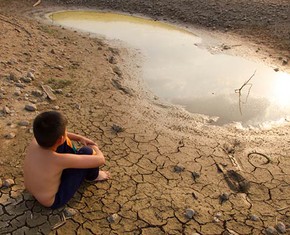The views expressed in our content reflect individual perspectives and do not represent the authoritative views of the Baha'i Faith.
When thou lookest about thee with a perceptive eye, thou wilt note that on this dusty earth all humankind are suffering. Here no man is at rest as a reward for what he hath performed in former lives; nor is there anyone so blissful as seemingly to pluck the fruit of bygone anguish. And if a human life, with its spiritual being, were limited to this earthly span, then what would be the harvest of creation? Indeed, what would be the effects and the outcomes of Divinity Itself? – Abdu’l-Baha, Selections from the Writings of Abdu’l-Baha, p. 184.
What is the purpose of suffering? What is its origin? What is its use? Why does it seem so brutal and random?
Questions like these are as old as mankind, and the successive explanations by philosophers and theologians have been the subject of many lengthy debates. One thing seems certain: suffering is inherent to the human condition. In other words: all human beings experience suffering at some point in their lives.
The major world religions all offer explanations for the existence of suffering. Some claim that all suffering is part of the development process of the soul on its way towards the Creator. They add that even if we fail to see any benefit from suffering during our earthly life, in the course of our existence we will find some benefit. Let’s take a quick look at the great world Faiths and their take on suffering:
Hinduism considers the suffering of individuals in a broader context of a cosmic cycle of birth, life, destruction and rebirth. Most Hindus view suffering as a punishment for sins committed in this life or past lives. For Hindus, even a seemingly innocent person who has not released the bad karma from past lives can suffer this punishment.
For most Buddhist schools all life is suffering, caused by attachment to worldly things. This attachment, which can take the form of greed, hate and ignorance in this life and in past lives, can turn into more suffering (karma) unless mitigated. Buddhists don’t necessarily see suffering as a divine punishment, but something that must be overcome through detachment from material objects and relationships.
The Old Testament contains some stories that describe suffering as due to weakness in devotion to God. Many Jews believe that suffering is also due to the free will that God gave to humans, and that His purpose in allowing suffering of the innocent should be good, though mysterious. For many centuries, the Book of Job shaped Jewish beliefs on suffering, but the Holocaust in World War II led many to rethink their views on this subject.
In Islam suffering is considered as a path of submitting to the will of God. Islam sees some suffering as the work of Satan or his associates in the world of spirits (the “jinn”), permitted by God as a test of humility and faith. Many Muslims believe that the suffering and adversity strengthen personal faith, and also that the pain often leads to repentance, prayer and good works.
Christianity adopted the story of Adam and Eve in the book of Genesis for many centuries as a justification for the existence of suffering. Christians typically understood that a perfect past existed in Eden, from which human beings fell into sin–and that all humans are sinners from birth. Christ appeared as a Redeemer of all human sins, most Christians believe, and the fruits of life of every human being can lead a person to incur eternal damnation or attain salvation.
Today, many Christians regard the creation story as completely symbolic. From that viewpoint, the concepts of “a fall from grace” or “eternal damnation” are seen as mythological expressions describing an unfolding process of awareness. Despite that newer interpretation, many Christians still see the Adam and Eve story as a literal truth.
This short summary of several explanations and justifications for the existence of suffering in the world’s major religions only skims the surface of one of humanity’s deepest and most persistent debates.
In the seventeenth century, the German philosopher Leibniz introduced the concept of Theodicy, in which he attempted to demonstrate that the presence of suffering in the world does not conflict with the goodness of God. Leibniz believed that suffering brought with it a greater good, or prevented an even greater evil; for this reason, he said, we live in the “best possible world.”
A hundred years later Voltaire flatly rejected the concept of theodicy, giving as an example the Lisbon earthquake in 1755 that killed thousands of people. For this French philosopher, suffering arises in a random, brutal and unjust manner, seemingly undeserved and excessive.
Also during the age of Enlightment, the Scottish philosopher David Hume restated Epicures’ old questions: Is God willing to prevent evil, but not able? Then he is impotent. Is he able, but not willing? Then he is malevolent. Is he both able and willing? Then whence evil?
After many centuries of theological and philosophical debates, the question remains: if God is perfect, why don’t we live in a perfect world? Considering the reality of sin and suffering, does God exist? If there must be suffering, why does it appear so disproportional and unfair? Why does God allow the suffering of innocent people, especially children? Was it God who created the suffering? Where is God when I suffer?
In this series of essays, we’ll take a serious look at those very serious questions and see if we can find some satisfactory answers. We’ll explore the Baha’i perspective on suffering, unique among all the world’s great Faiths, and examine its relationship to the profound question Abdu’l-Baha asks: “And if a human life, with its spiritual being, were limited to this earthly span, then what would be the harvest of creation?”

















Comments
Sign in or create an account
Continue with Googleor